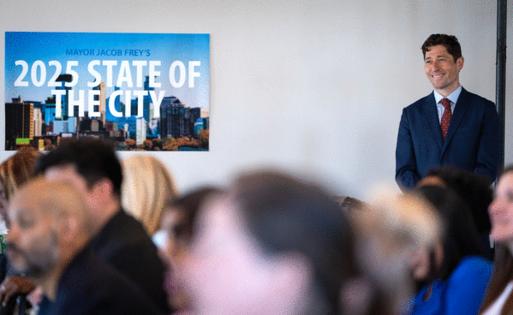Minneapolis Mayor Jacob Frey extends olive branch to foes, saying Democratic-run cities can be a beacon amid federal chaos
Published in News & Features
MINNEAPOLIS — Mayor Jacob Frey portrayed Minneapolis as a beacon of light in a chaotic country during his State of the City speech on Tuesday.
Frey, who is running for reelection this year, pushed back against President Donald Trump’s frequent portrayal of large, Democratic-run cities as cesspools of poverty and dysfunction. He urged Minneapolis not to “mirror the madness” or “respond to outrage with more outrage.”
“Let’s counter Donald Trump — not with our own brand of chaos, but with our own brand of collaboration," he said. “We won’t agree on everything — but we can agree on a whole lot more."
As his backdrop, he chose the Abyssinia Center on Lake Street, which the city helped an Ethiopian immigrant rebuild after he nearly lost the business amid the 2020 protests and violence in the wake of George Floyd’s murder by a police officer.
Frey drew parallels between the city and Abyssinia owner Abe Demmaj, who moved here from Ethiopia over 30 years ago.
“I came with big dreams, but with a small pocket,” Demmaj said.
The city itself is rising again, too, Frey said, after weathering some tough years, emerging from a pandemic and an international police brutality scandal.
Frey and all 13 council seats are up for re-election in November in what is shaping up to be a bruising battle for control of City Hall. Even though they’re all Democrats or democratic Socialists, the divide between them sometimes seems as wide as the gap between Republicans and Democrats.
Frey often has been at odds with the more progressive majority that controls the City Council; he vetoed a record number of measures last year, even delivering a historic veto of the city budget.
But on Tuesday, Frey extended an olive branch, complimenting two of his most vocal council critics. He called Council Member Robin Wonsley — a democratic Socialist he’s often at odds with — “an extraordinary advocate for working people.” Wonsley missed that part of the speech and declined to comment, saying “his comments can stand on their own.”
Frey said Council Member Jason Chavez “understands that our immigrant neighbors are part of what makes our city beautiful, and he cares deeply about his ward.”
They have different roles, but are on the “same damn team,” Frey said.
“That’s our team. That’s our city. Cooperating, toiling, and yes, occasionally arguing, but above all, we do the noble work of good governance for this great city and we do it damn well,” he said.
Chavez said he’s excited to work with the mayor on issues in his ward, especially environmental injustice and immigration “in this difficult times.”
“The message of unity is something I think is important for us as a community, making sure we’re working together to address the attacks from the federal government,” he said.
Council President Elliott Payne said he thought it was important that Frey highlighted the contrast between local and federal government, especially under the Trump administration, and to have a theme of uniting to stand up for Minneapolis residents.
“What I’m encouraged by is his willingness to go there in this speech and the ability to now demonstrate that in working with us going forward,” Payne said.
Frey touted a decline in violent crime, carjackings, gun violence and homicides, while celebrating an increase in police staffing.
Crime spiked in Minneapolis during the pandemic and after Floyd’s killing, and the city hemorrhaged police officers in the aftermath.
Frey said Minneapolis Police Department applications are up 135%, and the city is on track to have more than 600 sworn officers by year’s end. MPD had nearly 900 officers in 2019.
“Our department is also more diverse than ever — now with the highest percentage of minority officers on record," he said.
Frey touted the city’s nation-leading work in housing, by allowing more types of housing in more neighborhoods.
Minneapolis ended single-family exclusive zoning in 2019, approving over 1,000 new homes on lots that previously allowed only single-family or two-family housing. That has helped keep rent prices relatively in check.
The number of homeless encampments in the city is down dramatically after the Frey administration closed 17 encampments, dispersing hundreds of homeless people, in the second half of 2024.
Frey said the number of unsheltered homeless people is down 33% from 2020, and the number of emergency calls related to encampments is down 80%.
Payne said it’s important to highlight the city’s successes, but it’s important to “ground ourselves in reality.” The metro area needs 65,000 affordable units, he said.
Frey promised a comeback in Uptown, whose business district has struggled recently, and said Minneapolis’ North Side is “safer than it’s been in more than a decade,” with the lowest number of gunshot victims since 2014.
Last year, the North Side had 35 fewer gunshot victims than the prior year, a 21% reduction that put it at pre-pandemic levels.
The Winner gas station — nicknamed “Murder Station” due to drugs an gang violence — was the site of 38 shootings in 2021, but only one last year, Frey said.
And downtown, he said the Downtown Action Plan will make Nicollet Mall more walkable, energize the Warehouse District, and convert empty office spaces into new homes.
“From Uptown, to the Northside, to Downtown, we’re putting on a full-court press,” Frey said.
_____
©2025 The Minnesota Star Tribune. Visit startribune.com. Distributed by Tribune Content Agency, LLC







Comments